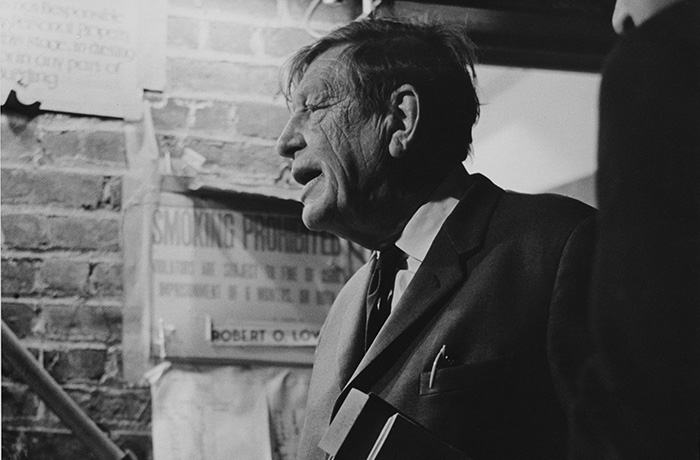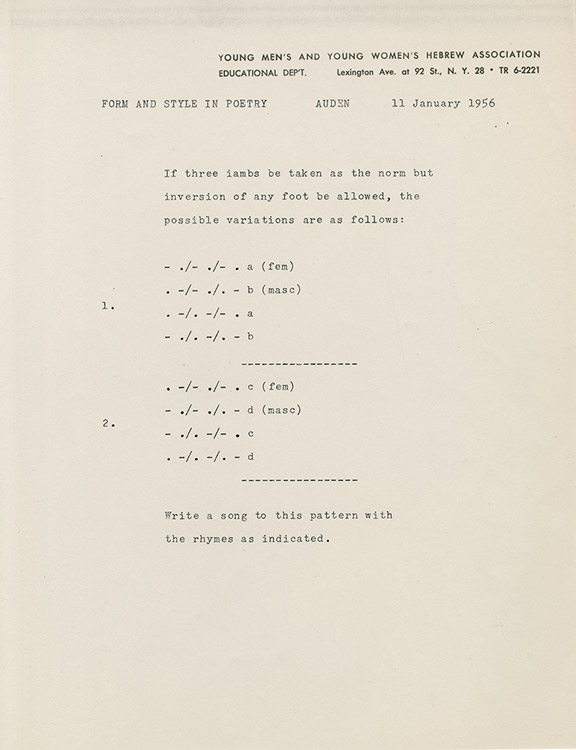I don’t know the backstory on this one. All I have is the assignment below, forwarded to me by my editor:
What is he even talking about. Actually, I can explain that. The part I can’t explain is how Auden can possibly have thought anything good was gonna come out of this assignment.
He was a glutton for punishment, I’ve heard. But you’d have to have a screw loose to hand out the above as an assignment. It’s not that the students wouldn’t do it; they’d try. But then you’d have to read the results. Take a sec and imagine the anger.
I had a girlfriend thousands of years ago who told me one of her concepts of hell was having to watch two virgins trying to have sex. For me, it’s watching beginners try to write in meter. O ye who care about this sort of thing, I’m sure you know what I’m talking about.
Back when I was on Facebook, I used to post limericks every other minute. ’Specially birthday limericks. Which of course resulted in my receiving birthday limericks, in my turn. Or what people thought were limericks. Here’s my spoof of the type of rhyme and meter to which I was annually exposed:
There once was a guy whose birthday it was, named Madrid,
And those circumstances me to set to writing a limerick bid.
Hysterica passio, down, thou climbing sorrow. And analogously, Auden must have suffered the agonies of the damned when he looked over his students’ attempts to fulfill the requirements of the prompt above. Granted, it cannot have been as bad in 1956 as it would be today. But it has to have sucked.
The assignment is really hard. Let me decipher it for all normal people. I’ll retype it so it’s clearer what he’s asking for:
The problem for the candidate (and Auden certainly knew this) is that the rhythm-making mind rebels against deliberately cutting to a twisted-up pattern. No poet starts with an irregular metrical mess and then fits words to it. The thing that happens is one writes loosely (e.g., counting only stressed syllables and ignoring where the unstressed ones fall) such that an irregular mess results—hopefully with an attractive ballad feel or something like that. There would be no point whatsoever in a poet’s engineering eight lines that happen to exhaust the possibilities of “substitutional arrangement” because not one person on Earth would even know the poet had done it.
Put it this way. Exhausting the possibilities for metrical substitutions is basically an Oulipo procedure. Someone would have to tell you it was there. Even someone who scanned the verses would never catch on. Or it’d be 1000-to-1 odds against.
Let me repeat: Auden knew all this perfectly well, and he knew that setting out to put stressed syllables right next to each other is counterintuitive to almost everybody, especially in short lines. I’ll mark the hot spots in red:
And worse! Auden didn’t just tell them to write a poem in this meter; he said he wanted it to be a song. That means it has to be singable; it can’t just be some brambly thorny nine-eyed web-footed Elizabethan epigram. So on top of everything else, it’s gotta go down smooth …
Now surely my editor sent me Auden’s thing knowing it was a medical certainty I would take the bait. (I’ve heard on Twitter she is currently writing a Jane Austen spoof about me, titled Pride and Pedantry.) And indeed, within forty-five minutes of receipt, I had rigged up a pile of unmeaning gibberish, just to see what the English language, driven through that meter, would even sound like. Below is what I wrote. I wish I could say it took only ten seconds. Actually, it was really hard.
All the girls are cryin’
—maroon pickle McGoo—
at least ya dad’s tryin’:
tryin’ to talk to you
Ya mom’s playin’ possum
—hey, maroon and Madrid!—
plucking a white blossom
and plucking’s all she did
Oh, whatever; that’s actually kind of good. Sharpshooters will note its resemblance to Edmund Spenser’s mighty roundelay in the August section of The Shepheardes Calendar (1579). But let’s X-ray it and make sure the meter’s right …
Good. It’s not a song, it only sorta makes sense, but it does scan. However: all this was days and days ago.
TODAY I set out to devise the thing I would have actually turned in to W. H. Auden if I had been in his class at the Young Men’s and Young Women’s Hebrew Association (better known today as the 92nd Street Y) sixty-two years ago. To warm up, I wrote several more stanzas of spangablasm:
Mira Buffam Reddy
Arrived wearing a hat
Goodbye to Tom Petty
Hail and farewell to that
… and so on. And then I was racking my brains to think of a subject for a song. (I was reminded of a bon mot I read recently, supposedly coined by my idol, Roger Miller. It was something like: “The mind is an amazing thing. It starts working before you’re even born, and it doesn’t stop until you sit down to write a song.”)
I’ve been obsessing over the third-century Chinese poet Ruan Ji lately, so I thought he might lend a hand. I wound up translating the first poem in his collection into that stupid meter:
Night, and idle notion
to rise, play on my lute.
The moon in slight motion,
mirrored in curtain folds. ← I know this doesn’t rhyme
Outside, lonely bird call,
hollow over north plains.
Pacing, I feel words all
are nothing. Grief remains.
Just so you can see what all I left out, here’s a legit translation, from An Anthology of Chinese Verse: Han Wei Chin and the Northern and Southern Dynasties, trans. J. D. Frodsham and Ch’eng Hsi (1967):
In the deep of night I found I could not sleep,
I rose, sat down, and played my singing lute.
My flimsy curtains mirrored the shining moon,
A pure breeze stirred the collar of my gown.
A lonely goose called in the wilds outside,
A bird hovered crying over the northern woods.
I paced up and down, wondering what I should see,
But only sad thoughts came to grieve my heart.
I was still looking for a song, though. I thought maybe a lullaby—? And here, dear reader, is where we bring this whole goat-rodeo clusterfuck to a close. And as for you, W. H. Auden, wherever you are, may you identify with the crow in the following song lyric and not with the owl. For it is better to talk in one’s sleep than to choke back a sob. A parable.
Once upon a time, kid,
the crow talked in its sleep.
The snowy owl minded,
swallowed an urge to weep.
The choke woke the swallow;
snow was falling in drifts:
covering North Hollow,
the robins, jays, and swifts.
And here’s the X-ray. Goodnight.
Anthony Madrid lives in Victoria, Texas. His second book is Try Never. He is a correspondent for the Daily.
from The Paris Review https://ift.tt/2HsbWWt





Comments
Post a Comment